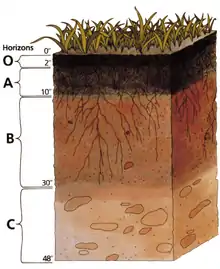Soil physics
Soil physics is the study of soil's physical properties and processes. It is applied to management and prediction under natural and managed ecosystems. Soil physics deals with the dynamics of physical soil components and their phases as solid, liquids, and gases. It draws on the principles of physics, physical chemistry, engineering, and meteorology. Soil physics applies these principles to address practical problems of agriculture, ecology, and engineering.[1]
Prominent soil physicists
- Edgar Buckingham (1867–1940)
- The theory of gas diffusion in soil and vadose zone water flow in soil.
- Lorenzo A. Richards (1904–1993)
- General transport of water in unsaturated soil, measurement of soil water potential using tensiometer.
- John R. Philip (1927–1999)
- Analytical solution to general soil water transport, Environmental Mechanics.
See also
Notes
- Lal, Rattan; Manoj Shukla (2004). Principles of Soil Physics. CRC Press. p. 5. ISBN 0-8247-5324-0.
- Horton, Horn, Bachmann & Peth eds. 2016: Essential Soil Physics Schweizerbart, ISBN 978-3-510-65288-4
- Encyclopedia of Soil Science, edts. Ward Chesworth, 2008, Uniw. of Guelph Canada, Publ. Springer, ISBN 978-1-4020-3994-2
External links
 Media related to Soil physics at Wikimedia Commons
Media related to Soil physics at Wikimedia Commons- SSSA Soil Physics Division
This article is issued from Wikipedia. The text is licensed under Creative Commons - Attribution - Sharealike. Additional terms may apply for the media files.
